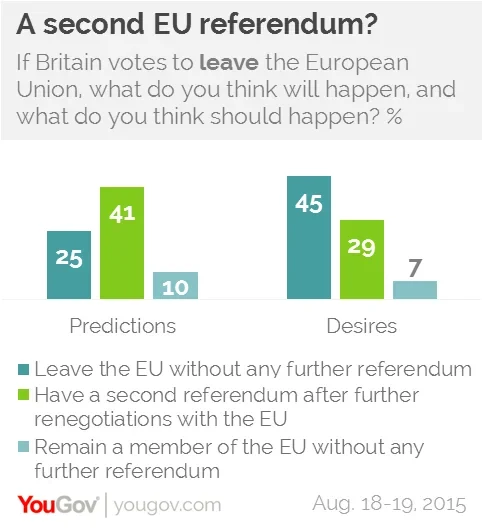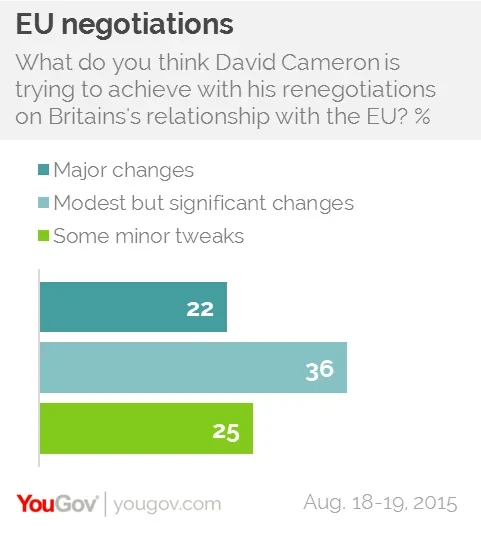Voters are sceptical that a No vote in the coming EU referendum would lead to an unconditional departure from the EU – or that David Cameron would support an exit if he doesn’t secure reforms
David Cameron indicated last September that if he fails to renegotiate the terms of Britain’s membership of the European Union then he could be prepared to recommend an exit. He reiterated the point in June – “I have always said if I don’t succeed… I rule nothing out” – when an account of a private meeting between the prime minister and an EU leader documenting key negotiation points was leaked. Boris Johnson has instead suggested voters should say No to membership of the EU, to extract greater concessions, before holding a second referendum where Yes would be recommended.

YouGov’s latest referendum polling using the official question wording that will be put to the public in 2017 has Yes leading by 7 points, on 44% compared to No’s 37%. However, there is little confidence that if Britain did vote to leave the EU it would entail a straightforward departure from the Union.
Faced with the suggestion, voters tend to predict that even if the result of the referendum is No, there would probably be a second referendum after further negotiations. 41% say this, while only 25% are confident No would mean no.
This runs contrary to people’s hopes – 45% say Britain should leave the EU without any further referendum if No is the most popular answer. 29% say there should be a second referendum.
Scepticism
In the leaked document from June which emerged after Cameron briefly trailed his negotiation plans at a working dinner of EU leaders, it appeared he had condensed his list of demands. An emergency brake on immigration from the EU did not appear, although there was mention of withdrawing from the commitment to “ever closer union”.

Only 22% of British people believe the prime minister is trying to get major changes to Britain’s relationship with the EU. 36% say his efforts are for modest but significant changes and 25% suspect he is only pushing for minor tweaks. Most British people (67%) think other EU countries would rather Britain kept its membership, but won’t offer us much to stay.
And there is little confidence that David Cameron has any intention of advocating the UK’s departure from the EU if negotiations fail. Only 18% of British adults say the prime minister may choose which side to advocate depending on the success of his negotiations, while the majority (60%) expect him to side with Yes regardless.
Whatever the outcome of negotiations with the EU, any significant reforms are unlikely to be implemented before the referendum. The prime minister’s officials have said a new deal would be “legally binding”, however it would have to be included in the next treaty which could take until 2025 to complete.
PA image






